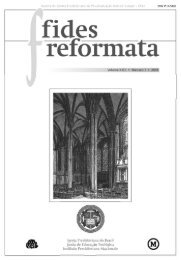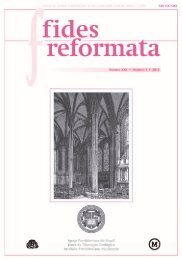Fides 22 N2
Um publicação do Centro Presbiteriano de Pós-graduação Andrew Jumper.
Um publicação do Centro Presbiteriano de Pós-graduação Andrew Jumper.
You also want an ePaper? Increase the reach of your titles
YUMPU automatically turns print PDFs into web optimized ePapers that Google loves.
FIDES REFORMATA XXII, Nº 2 (2017): 139-162<br />
reactions against doctrinal matters. As the ecumenical slogan goes, “doctrine<br />
divides but work unites.” 56<br />
But Neill went beyond those comments. Believing that there were other<br />
reasons for such indifference to “missions” during the Reformation, he said,<br />
“In the sixteen century the Protestant powers were not in touch with the wider<br />
world outside Europe.” 57 Also, “the geographical limitations were strongly<br />
reinforced by the psychological limitations of the concept of the regional<br />
Church, the Landeskirche [ 58 ]. Cuius regio, eius religio[ 59 ] – in each area the<br />
ruler is responsible for the spiritual welfare of his people. He has no responsibility<br />
for anything outside.” 60 In other words, the reformers enclosed themselves<br />
in their own limited cities, states, or countries and understood their mission to<br />
be inside their assigned areas.<br />
Neill uses a critic of the sixteenth century, “Roman Catholic controversialist<br />
Robert Bellarmine,” as a source against the Protestants. Paraphrasing<br />
Bellarmine, Neill states that the reformers “had no comparable missionary<br />
activity.” “In Poland and Hungary [the Lutherans] have the Turks as their near<br />
neighbours, [but] they have hardly converted even so much as a handful.” 61 Neill<br />
interprets such a comment as “a damaging charge, and it cannot be said that the<br />
Protestants were happy in their attempts to answer it.” 62 Neill continues: “The<br />
Protestants tended to say ‘Missions are neither obligatory nor desirable, and<br />
our lack of them cannot be held against us as blindness or unfaithfulness.’” 63<br />
56 John H. Leith, “Reformed Theology,” in Donald K. McKim, ed. Encyclopedia of the Reformed<br />
Faith (Louisville: Westminster/John Knox Press; Edinburgh: Saint Andrew Press, 1992), 367. Other<br />
statements have appeared with similar connotation: “theology divides but love unites,” “Jesus unites,<br />
theology divides,” or “theology divides but love unites.”<br />
57 Neill admits that “the whole situation underwent radical alteration in the seventeenth century,<br />
when Holland and England became great maritime powers” (Neill, History of Christian Missions, 188).<br />
But he insists that such geographical alteration did not affect the theological climate.<br />
58 The church of an independent state (land or region); a “national church.” According to John Miller,<br />
“During the Reformation era the churches were organized on the territorial principle (Landeskirche),<br />
whereby the prince or ruler of a state in the then-existing Holy Roman Empire determined the confession<br />
of his subjects” in Missionary Zeal and Institutional Control: Organizational Contradictions in the<br />
Basel Mission on the Gold Coast, 1828-1917. Foreword by Richard V. Pierard. Grand Rapids: Eerdmans,<br />
2003, xii.<br />
59 “Whose the region, his the religion” was a principle adopted by the Religious Peace of Augsburg<br />
(1555) by which the rulers decided the religion of their realms See Thomas M. Lindsay, A History of<br />
the Reformation: The Reformation in Germany from Its Beginning to the Religious Peace of Augsburg<br />
(New York: Charles Scribner’s Sons, 1906), 397.<br />
60 Neill, History of Christian Missions, 188.<br />
61 Ibid., 189. The source used by Neill is a quote from Robert Bellarmine’s book Controversiae,<br />
Book IV. This quote was mentioned by Carl Mirbt in his book: Quellen zur Geschichte des Papsttums<br />
und des Römischen Katholizismus (3 rd ed., 1911).<br />
62 Ibid., 189.<br />
63 Ibid.<br />
153




